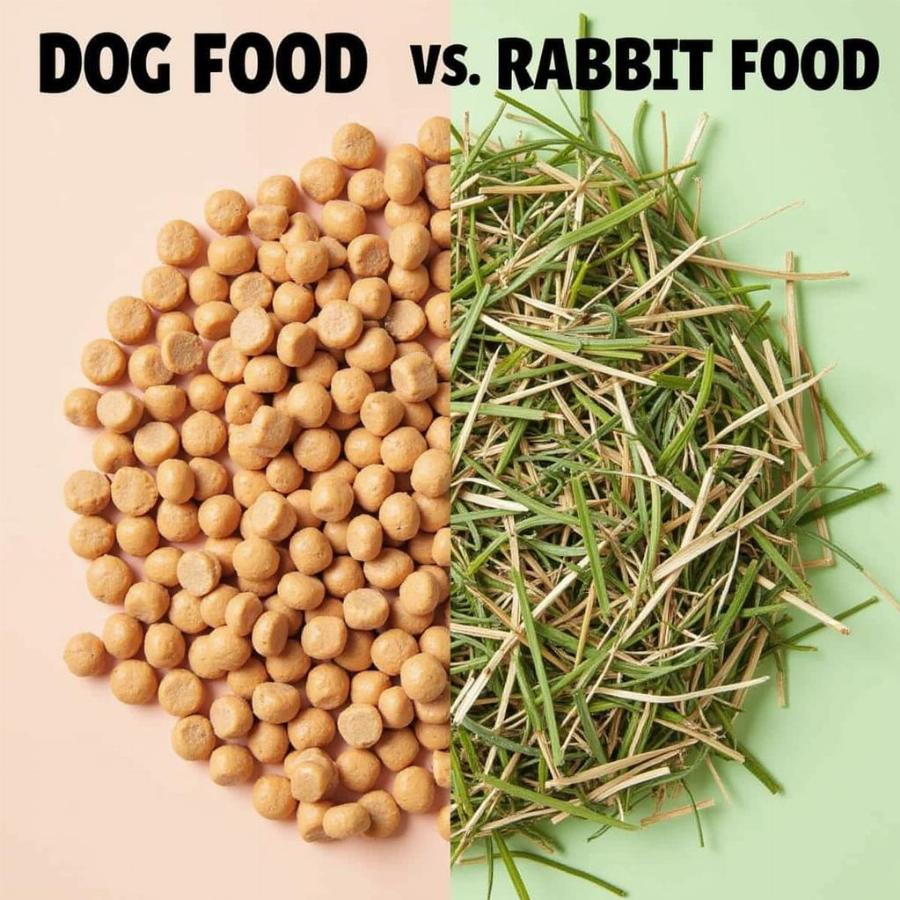Dog food rabbit is becoming an increasingly popular choice for pet owners seeking a novel protein source for their furry friends. But is rabbit meat truly a beneficial addition to a dog’s diet? This article delves into the nutritional value, benefits, and potential drawbacks of incorporating rabbit into your dog’s meal plan.
Understanding the Nutritional Value of Rabbit in Dog Food
Rabbit meat is a lean protein source, packed with essential amino acids necessary for muscle development and overall health. It’s also a good source of B vitamins, particularly B12, which plays a crucial role in nerve function and red blood cell production. Furthermore, rabbit contains valuable minerals like iron and phosphorus, contributing to strong bones and healthy blood. Compared to other protein sources like chicken or beef, rabbit is generally lower in fat and calories, making it a suitable option for dogs prone to weight gain or those requiring a low-fat diet.
Benefits of Rabbit Dog Food
For dogs with food sensitivities or allergies, rabbit can be a lifesaver. As a novel protein, it’s less likely to trigger allergic reactions compared to common allergens like beef, chicken, or lamb. This makes rabbit dog food an excellent choice for dogs with itchy skin, digestive upset, or other allergy-related symptoms. The lean nature of rabbit meat also helps maintain a healthy weight, reducing the risk of obesity-related health problems like joint issues and diabetes. Moreover, the high digestibility of rabbit makes it easier for dogs to absorb nutrients, leading to improved overall health and vitality.
Potential Drawbacks and Considerations
While rabbit offers numerous benefits, there are a few potential drawbacks to consider. Rabbit can be more expensive than other protein sources, making it a less budget-friendly option for some pet owners. Furthermore, finding rabbit-based dog food can sometimes be challenging, depending on your location and preferred pet store.
Is Raw Rabbit Safe for Dogs?
Raw rabbit, like any raw meat, carries the risk of bacterial contamination, such as Salmonella and E. coli. These bacteria can pose health risks to both dogs and humans. If you choose to feed your dog raw rabbit, ensure it comes from a reputable source and practice strict hygiene when handling it.
Can Dogs Eat Rabbit Food Intended for Pet Rabbits?
Rabbit food formulated for pet rabbits is not suitable for dogs. Rabbit food is designed to meet the specific nutritional needs of rabbits, which differ significantly from those of dogs. Feeding dog rabbit food specifically formulated for canine consumption is essential to ensure they receive the correct balance of nutrients.
 Comparing Dog Food and Rabbit Food
Comparing Dog Food and Rabbit Food
Choosing the Right Rabbit Dog Food
When selecting rabbit dog food, look for high-quality brands that prioritize rabbit as the primary ingredient. Avoid foods with fillers, artificial colors, and flavors. Consult your veterinarian for recommendations based on your dog’s specific needs and health conditions.
How to Introduce Rabbit Dog Food to Your Dog
Introduce rabbit dog food gradually to avoid digestive upset. Start by mixing a small amount of rabbit dog food with your dog’s current food, slowly increasing the proportion of rabbit food over several days. Monitor your dog for any adverse reactions, such as vomiting or diarrhea.
Is Rabbit Dog Food Right for My Dog? Can My Senior Dog Eat Rabbit?
Rabbit dog food can be a great option for dogs of all ages, including seniors. Its lean protein and high digestibility make it easy on the digestive system. Is your dog experiencing allergies or struggling with weight management? Then rabbit dog food might be the perfect solution. Remember to always consult with your veterinarian before making any significant changes to your dog’s diet. They can provide personalized guidance based on your dog’s individual needs and health status.
Conclusion
Dog food rabbit offers a nutritious and hypoallergenic protein source for your canine companion. While it may be slightly more expensive and less readily available than other protein options, the benefits of rabbit dog food, particularly for dogs with allergies or weight concerns, can be substantial. Always prioritize high-quality brands and consult with your veterinarian before switching your dog’s diet.
FAQ
-
Is rabbit meat good for dogs with sensitive stomachs? Yes, rabbit is highly digestible and often well-tolerated by dogs with sensitive stomachs.
-
Where can I buy rabbit dog food? You can find rabbit dog food at specialty pet stores, online retailers, and some veterinary clinics.
-
How much rabbit dog food should I feed my dog? Follow the feeding guidelines on the product packaging and consult your veterinarian for personalized recommendations.
-
Can puppies eat rabbit dog food? Yes, rabbit dog food can be a suitable option for puppies, provided it’s formulated for their specific nutritional needs.
-
Is cooked rabbit bone safe for dogs? Cooked bones, including rabbit bones, can splinter and pose a choking hazard. Avoid feeding cooked bones to your dog.
-
What are some good alternatives to rabbit dog food for dogs with allergies? Other novel protein sources like venison, duck, or kangaroo can be good alternatives to rabbit for dogs with allergies.
-
Can I mix rabbit dog food with other protein sources? Yes, you can mix rabbit dog food with other protein sources, but monitor your dog for any digestive upset.
Beaut Dogs is your trusted resource for comprehensive and reliable information on the world of dog breeds. Beaut Dogs provides expert advice on everything from breed selection to nutrition and training. When you need support, contact us via Email: [email protected] for detailed and accurate answers from Beaut Dogs. Visit us at https://beautdogs.com to learn more.